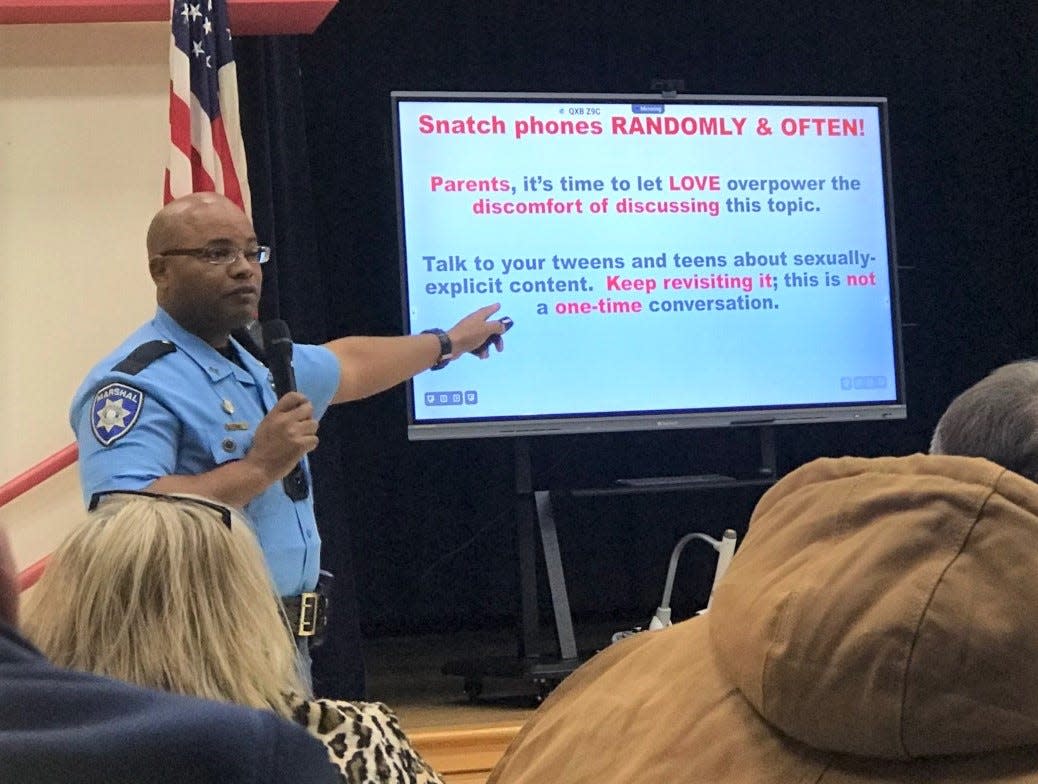Parents advised to monitor children's phones for sexually explicit material

Deputy Marshall Henry Tre Lewis III told parents of Jefferson County students that they should regularly go through their children’s phones looking for sexually explicit material and signs that younger teens and pre-teens may be being targeted or groomed by older individuals looking to take advantage of them.
School Superintendent Sam Dasher and the school board recently invited Lewis to talk to parents about the dangers of social media and the need for clear boundaries as a part of an ongoing community outreach program that started in the fall.
Lewis advised parents to snatch their children’s phones when they are on them, the phone is unlocked and in use.
“Snatch phones randomly and often. Literally, don’t let them see you coming and take it,” Lewis said. “Parents, it’s time to let love overpower the discomfort of discussing this topic. We are not their friends, we’re their guardians. Talk to your tweens and teens about sexually explicit content. Keep revisiting it; this is not a one-time conversation.... Read their texts and emails. Look at their pictures, social media and other apps. This is not an invasion of privacy, it is your responsibility as a parent to keep your tween or teen safe in the age of technology.”
Lewis said that once a child starts searching for even moderately sexual material, algorithms built into social media and search engines will push more and more of that content, which can lead to the hyper sexualization of children who are not prepared emotionally or mentally for what they see.
“Kids don’t have to be looking for adult content to find it. It is programed to find them,” Lewis said.
He recommends parents look for teachable moments in the media and daily life. If small children come across adult content online, encourage them to turn it off and talk to a trusted adult. It is also important to reassure them that they will not be in trouble if they bring what they saw to a parent right away. This helps teach responsible online behavior. He also recommends parents insist that phones, computers and tablets be used in the main living areas and kept out of private spaces like bedrooms.
A native of Jefferson County, Lewis, who currently works as a deputy marshal with the Richmond County Sheriff’s Office’s Felony Unit has worked been working has been an investigation police professional for more than 20 years. He is a GA Police Officer Standards and Training (POST) senior instructor and has served as an FBI Task Force Officer investigating underage prostitution, child sexual exploitation enterprises, child abductions, production of child pornography and the sex trafficking of minors.
He warns parents that there are groomers who are older who will give children sexually explicit material.
“What does a child molester look like? Does he look like a teacher, a pastor, a physician, police officer? I’ve arrested all of them. Even adult friends of the family,” Lewis said. “There is no look. He can be anybody.”
Predators often try to get children to have secret conversations online or on a cell phone. Lewis tells parents to take these devices and monitor know who their children are talking to and what is being said.
He warned parents about EXIF data, information recorded and embedded by many devices when they take photographs. This information can be used to track a child’s location, to learn where they live and locations they frequent.
Lewis advised parents to use the website www.familywatchdog.us to find the location of registered sex offenders near their homes, schools and other areas their children visit.
“If you don’t snatch your kid’s phone you are putting them at risk,” Dasher said. “When it comes to this kind of stuff, it’s not about being friends with your kids. Your kids don’t have rights. They don’t have privacy. You pay that bill. As long as you are paying that cell phone bill, that’s your phone. And if your child has a problem with that, they probably don’t need that phone.”
The school system will be holding its next community outreach meeting Feb. 23, at 6 p.m. at Wrens Elementary. The primary focus of that meeting will be a discussion on whether or not students should be allowed to bring cell phones into the schools and what policies should police their use while in the classroom.
This article originally appeared on Augusta Chronicle: Parents advised to monitor children's phones for explicit material

